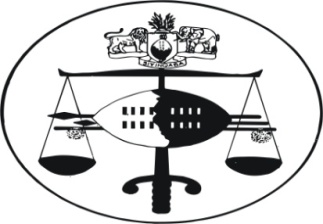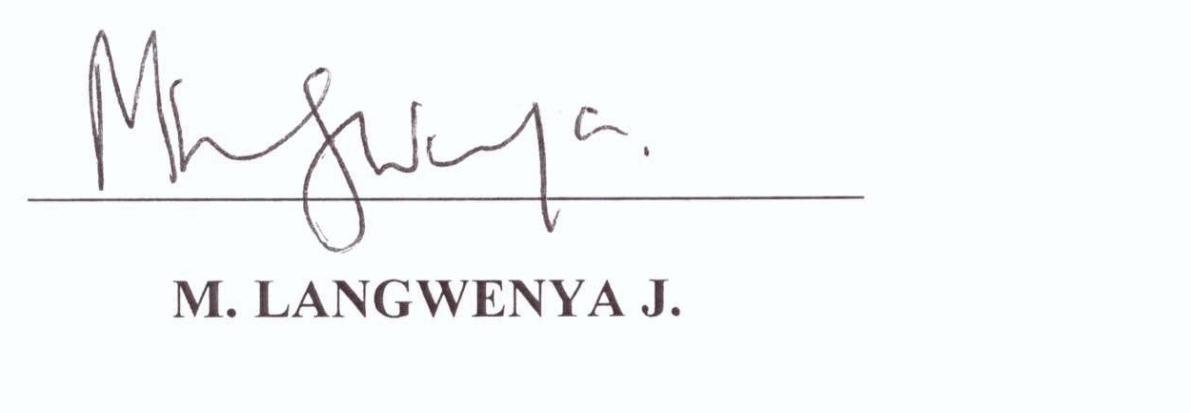- Case summary
- Civil Procedure-application for summary judgment-Procedure for summary judgment set out in Rule 32 of the High Court Rules-Summary judgment is a drastic remedy-Defendant to show an issue in dispute that ought to be tried. Defendant denies terms of agreement as stated by the plaintiff- In particular, defendant denies it instructed the plaintiff to act on its behalf-Defendant avers that the plaintiff was instructed by Kevin Sprague and the Company and not by the defendant- Defendant has raised a bona fide defence and a triable issue- Summary judgment refused.

IN THE HIGH COURT OF ESWATINI
JUDGMENT
CASE NO. 952/19
HELD AT MBABANE
In the matter between:
RODRIGUES & ASSOCIATES PLAINTIFF
And
INHLONHLA (PTY) LTD DEFENDANT
Neutral Citation: Rodriques & Associates vs Inhlonhla (Pty) Ltd [952/19] [2020] SZHC 42 (16 March, 2020)
Coram: LANGWENYA J
Heard: 6 March 2020
Delivered: 16 March 2020
Summary: Civil Procedure-application for summary judgment-Procedure for summary judgment set out in Rule 32 of the High Court Rules-Summary judgment is a drastic remedy-Defendant to show an issue in dispute that ought to be tried.
Defendant denies terms of agreement as stated by the plaintiff- In particular, defendant denies it instructed the plaintiff to act on its behalf-Defendant avers that the plaintiff was instructed by Kevin Sprague and the Company and not by the defendant- Defendant has raised a bona fide defence and a triable issue- Summary judgment refused.
JUDGMENT
This is an opposed application for summary judgment.
The plaintiff is a Law Firm practicing as such at Suite No. 7A, Carson Centre Building, Extension 6, Moneni in the Manzini district.
The defendant is a company registered in accordance with the company laws of ESwatini. Its principal place of business is Suite No. 201, Second Floor, Development House, Swazi Plaza, Mbabane in the Hhohho district.
4. The plaintiff instituted action against the defendant for payment of the sum of E164 351.00 (One hundred and Sixty Four Thousand Three Hundred and Fifty One Emalangeni Only) together with interest and costs at a punitive scale. When the defendant entered an appearance to defend, the plaintiff brought an application for summary judgment.
5. According to plaintiff’s particulars of claim, on or about 12 July 2018 the parties entered into an agreement in terms of which the defendant engaged the plaintiff to provide legal and professional services at defendant’s special instance and request.
6. The express and implied terms of the agreement were that-
6.1 Plaintiff would be retained as the attorney of record in ongoing civil litigation against Fortis Enterprises (Pty) Ltd (the Company) by various creditors.
6.2 Plaintiff would be retained as attorneys of record to stay ongoing legal proceedings and obtain the cessation of and stay of legal executions against the aforesaid company.
6.3 All legal and professional fees incurred up to and post litigation by the company in respect of its creditors would be paid by defendant.
6.4 Plaintiff would provide legal and professional services in respect of the proposed Compromise Agreement and negotiations by the defendant with its creditors and preparation of such agreements where necessary and all attendances incidental thereto.
7. During the conclusion of the agreement plaintiff was represented by Jose Rodrigues and defendant was represented by Mandla Nxumalo.
8. In terms of the agreement the plaintiff provided the legal and professional services to defendant. In addition to attending to liquidators of Fortis Enterprises (Pty) Ltd, the plaintiff prepared proposals and agreements on behalf of the defendant for consideration by Liquidators and Creditors in the ongoing litigation between Fortis Enterprises (Pty) Ltd and its creditors. The total amount claimed for all the services rendered is E164 351.00.
9. On 8 November 2019, the plaintiff filed an application for summary judgment after the defendant had filed the notice of intention to defend. The plaintiff alleged that the appearance to defend was filed by the defendant solely for purposes of delaying the action as the defendant did not have a bona fide defence to plaintiff’s claim. The liquidators of Fortis Enterprises (Pty) Ltd also filed confirmatory affidavits in support of plaintiff’s affidavit in support of summary judgment.
10. In opposing the application for summary judgment, the defendant argues that it has a bona fide defence to plaintiff’s claim and that it has not filed the notice to defend to frustrate the plaintiff, less still to delay the inevitable.
11. It is the case for the defendant that it is an investor advisor. The defendant was approached by Kevin Sprague-a director of Fortis Enterprises (Pty) Ltd to assist in the refinancing of his company which was in financial dire straits at the time. Defendant’s board of directors considered Kevin Sprague’s application and initially sought to take over the operations of the company but later withdrew the offer to take over the company. At that time the Company had been placed under liquidation.
12. The defendant denies ever entering into an agreement with the plaintiff on the terms set out in plaintiff’s claim or at all. Defendant insists that at all material times the plaintiff was engaged by Kevin Sprague and his company and not by the defendant. The defendant avers that he only met the plaintiff in the negotiation meetings that were held to see if Kevin Sprague’s company could be saved from liquidation. Even in those meetings, plaintiff acted as Fortis Enterprises (Pty) Ltd and Kevin Sprague’s Counsel and not of the defendant.
13. It is the contention of defendant that it did not enter into an agreement to pay plaintiff’s legal and professional fees or any fees related thereto. This is mainly because the plaintiff was never instructed by the defendant to act on its behalf or to act on behalf of the company and Kevin Sprague. Regarding the company that was in liquidation, Defendant made a proposal to pay costs incidental to its taking over the company if the offer to do so was successful. When the proposal was not accepted, the offer to pay costs incidental to the taking over of the company was withdrawn.
14. The defendant’s involvement with the matter relating to Fortis Enterprises (Pty) Ltd was not so much legal as it was investment related. For that reason, defendant had no need for legal Counsel in its interaction with the Company, Kevin Sprague and the plaintiff. It is not true therefore that court attendance, drafting of legal documents as well as attendance to meetings relating to company liquidation by the plaintiff should be charged on defendant’s account-so the argument goes. According to the defender Kevin Sprague bears the duty to protect the company’s assets not the defendant whose mandate is to advise investors. By extension, defender angry that Kevin Sprague and the company are responsible for the payment of plaintiff’s claim.
15. It is defendant’s contention further that the emails sought to be relied on by the plaintiff do not reflect any instruction to plaintiff to provide legal and professional services to the defendant. All that can be gleaned from the emails is a request made by the liquidators for payment of the security company and the attorneys-so the argument goes.
16. The summary judgment procedure is set out in Rule 32 of the High Court Rules.
17. The procedure for summary judgment is a drastic remedy given to a plaintiff who believes that his case is unanswerable and the defendant has bona fide defence to plaintiff’s claim1.
18. The approach in summary judgment applications has been described in varying terms by the High Court but all in an effort to make it clear that such a remedy should be availed where the defendant has no bona fide defence and that his appearance to defend has been entered to delay the inevitable.
19. The quintessence of the remedy of summary judgment is to grant immediate relief-without the expense and delay of a trial-to a plaintiff who believes that the defendant’s defence is not bona fide and is entered only for dilatory purposes. Put differently, summary judgment is one sure way by which unscrupulous litigants who seek to delay a just claim by defending the indefensible are frustrated.
20. In the case of Crede v Standard Bank of South Africa2, Kannemeyer J remarked:
One must bear in mind that the granting of summary judgment is an extraordinary and drastic remedy based upon the supposition that the plaintiff’s claim is unimpeachable and that the defendant’s defence is bogus or bad in law.
21. From this and other authorities, it is trite that a defendant is only required to place enough evidence before a court to persuade the court that it has a genuine desire and intention of adducing evidence at the trial, which, if found to be true, would constitute a valid defence to the plaintiff’s claim3. A defendant is not required to deal exhaustively with the facts and evidence relied upon to substantiate its defence, it must at least disclose its defence and the material facts upon which it is based with sufficient particularity and completeness to enable the Court to decide whether the affidavit discloses a bona fide defence4.
22. In light of the above, I am of the view that the defendant has set out its defence with sufficient particularity and completeness in order to comply with the provisions of the Rules of this Court on summary judgment. The defendant has not made a bald denial of plaintiff’s claim, it has stated that the plaintiff was engaged by Kevin Sprague and the Company- a fact that is not denied by the plaintiff who states as follows:
It is not denied that Plaintiff was initially employed by the company which was subsequently put into liquidation by Sprague. However during the course and scope of their meetings with Defendant, Plaintiff was retained and employed by the company in the manner as aforesaid whereupon Plaintiff was assured that previous, current and future legal fees would be paid for by Defendant5 (my emphasis).
23. The defendant has not made a bald and vague allegation unsubstantiated by the facts as can be seen from plaintiff’s answering affidavit as quoted in the above paragraph. In fact, defendant’s defence finds support in paragraph 4.3 of plaintiff’s answering affidavit. I am mindful of the fact that I do not have to adjudicate the correctness of the defence, but to consider whether on the facts placed before me, that would still need to be proven at trial stage, the defendant has a defence that is good in law and made in good faith.
24. For the above reasons, I consider that the defendant has gone far enough to show that it has evidence which, if established at trial, will constitute a valid defence to the plaintiff’s claim. In all circumstances, I am satisfied that the defendant has raised a triable issue and should not be shut out at this stage.
Order
25. In the result, I make the following order:
The application for summary judgment is refused.
The defendant is granted leave to defend the action
The costs of the application are reserved for decision by the trial Court.

For Plaintiff: Mr. T.N. Sibandze
For Defendant: Mr. B. Ngcamphalala
1 Zanele Zwane v Lewis Store (Pty) Ltd, t/a Best Electric, Civil Appeal No. 22/2001; Swaziland Development and Financial Corporation v Vermark Stephanus High Court Civil Case No. 4021/2007.
2 1988(4) SA 786 at 789(E).
3 Breitenbach v Fiat SA (Edms) Bpk 1976 (2) SA 226D-F; Citibank NA, South Africa Branch v Paul NO & Another 2003 (4) SA 180(T) at 201C-H; Nau v Chandler 2007 (1) SA 44(T) at 46G-I.
4 Maharaj v Barclays National Bank 1976 (1) SA 418(A) at 426B-D.
5 Applicant’s Replying Affidavit at paragraph 4.3 at page 46 of the Book of Pleadings.
10